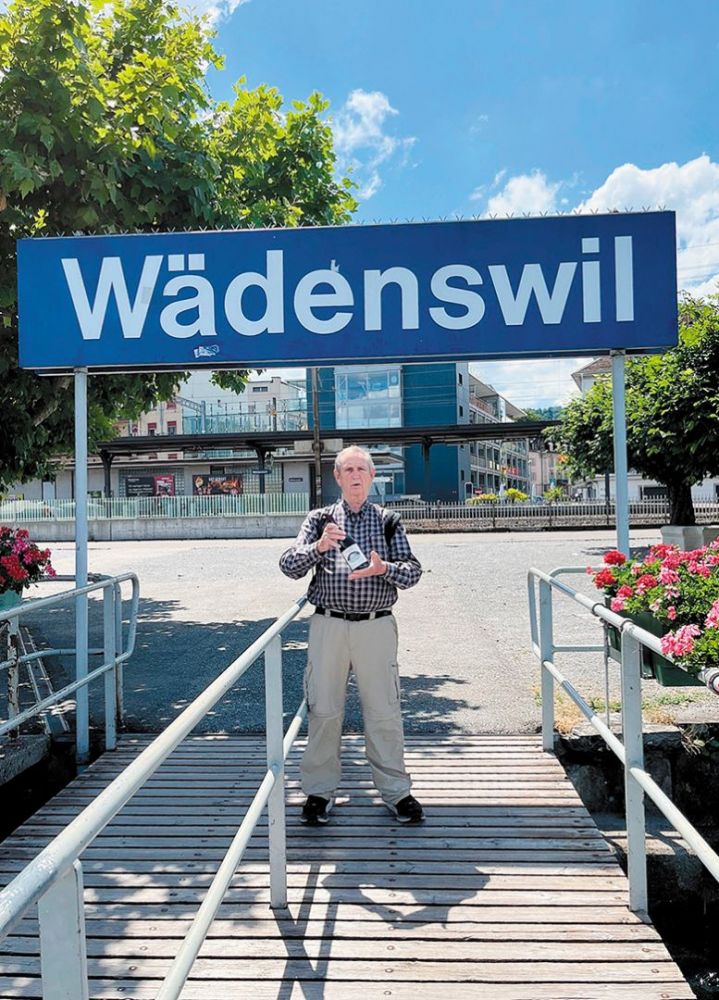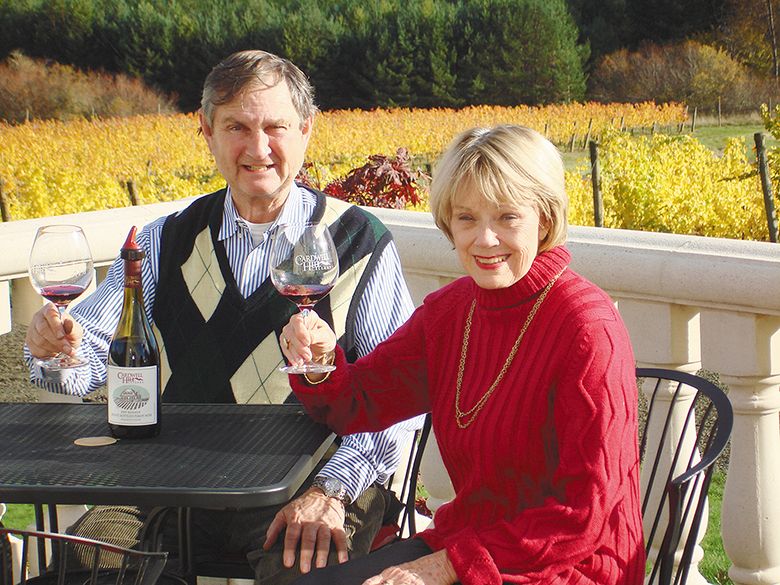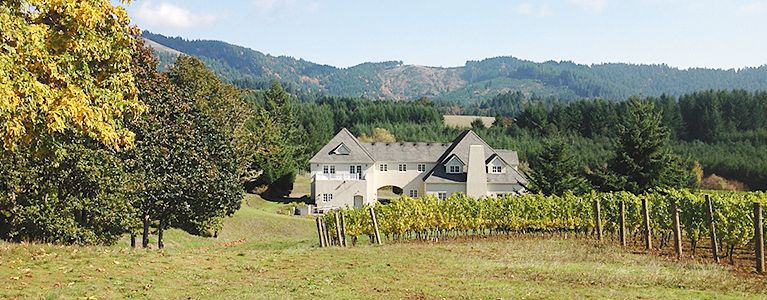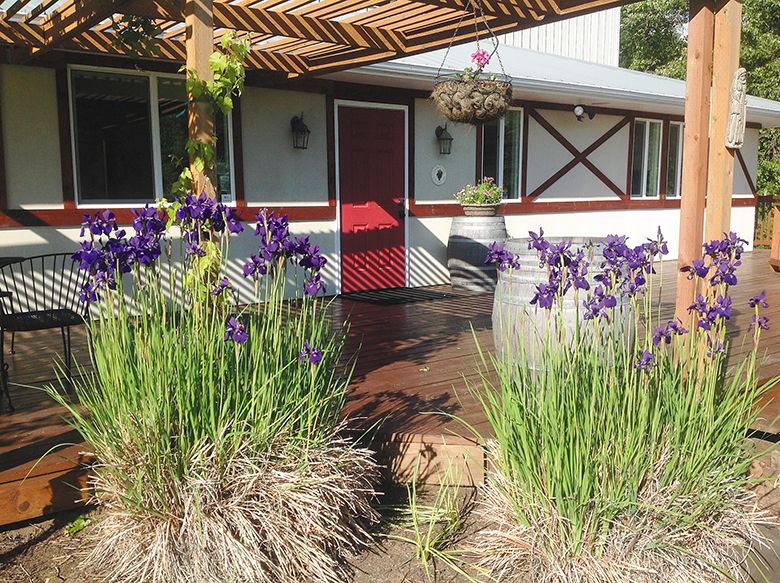Swiss Roots, Oregon Fruits
Cardwell Hill Cellars marks 25 years of estate-grown excellence




By Greg Norton
Cardwell Hill Cellars began on a hiking trail in Switzerland, where a conversation at 6,000 feet forever changed two lives, leading to a 25 year celebration at the vineyard.
Owners Dan and Nancy Chapel invite the public to the winery’s celebratory event over Labor Day weekend, Aug. 29 to Sept. 1. Enjoy live music, bocce ball games, vineyard tours, and of course, award-winning wine.
Located near Corvallis, close to the quaint town of Philomath, Cardwell Hill Winery’s name comes from its address on Cardwell Hill Drive, named after Oregon pioneer Byron P. Cardwell. The Cardwell family arrived in Corvallis in 1852 and homesteaded on property acquired through the Donation Land Claim Act.
Cardwell farmed while operating a photography business in Portland. Later, he was appointed deputy collector of internal revenue by President Lincoln and served in the state legislature.
SWISS CHEMISTRY
Despite more than two decades of winemaking, the Chapels weren't always vintners. Dan spent 42 years with Fluor Corp., rising to senior vice president. He holds degrees in chemistry and chemical engineering. Nancy, equally credentialed, has a bachelor’s degree from UC Berkeley along with master’s degrees in psychology and career counseling.
Their wine journey began during Dan's corporate transfer to Fluor's Düsseldorf office, where the couple immersed themselves in European wine culture. For years, Nancy encouraged Dan to dream of an “active retirement,” something beyond the corporate world. After careful consideration, they decided to pursue wine– specifically Pinot Noir.
In 1998, the Chapels visited Oregon with modest expectations. After visiting several properties, they discovered an abandoned vineyard near Corvallis. Tumbledown poles, half-finished trellising and a few stubborn vines embodied forgotten ambition. It had promise. But timing clashed with reality– the very same day, Dan received a promotion with global responsibilities. Their dream was shelved.
Everything changed the following summer. While hiking in Switzerland, the couple drank local wine nightly and marveled at the country's steep vineyards. The connection felt profound; Swiss immigrants had founded Fluor Corp. itself, and the Fluor name originated in Switzerland. Near the end of their trip, while hiking in Verbier, Dan turned to Nancy, suggesting they take another look at the abandoned Oregon vineyard. She didn't hesitate: “Yes.”
Their second inspection revealed both promise and challenge. One plot of Pinot Noir had taken root, but other blocks remained unfinished. Poles lay scattered and wire lay beneath tall weeds. The previous owners had walked away. The Chapels did not.
They finalized the purchase while Dan worked full time. Since neither had any farming experience, they hired a vineyard manager and began assembling a team for the major recovery effort.
Salvaging the posts and wire, a single block of vines was saved. Remarkably, it contained Wädenswil, a Swiss clone of Pinot Noir. It felt like destiny.
THE SWISS CLONE
“Clone” may evoke memories from a “Star Wars” movie, but in wine growing, it refers to genetically identical grapevines propagated from a common mother plant. Clonal selection typically results from rigorous trials aimed at selecting desirable growth, flavor and ripening qualities while minimizing the presence of viruses.
The Swiss Federal Research Institute in Wädenswil, near Zurich, has long focused on clonal research. According to The Eyrie Vineyards’ Jason Lett, Pinot Noir arrived in Switzerland from Burgundy in the 17th century. One clone, developed by the Swiss at Wädenswil, was brought to UC Davis by Dr. Harold Olmo. David Lett, Jason’s father, introduced it to Oregon in the 1960s. The Wädenswil clone remains a key component in our region's wines.
In 2001, the Chapels produced one barrel of Pinot Noir from their partially refurbished Wädenswil block, with the help of custom crush partners at LaVelle Vineyards, near Eugene. That same year, they planted 27,000 grafted vines– Pommard, 777 and 115 clones. They built a management center with a 4,000-square-foot underground warehouse, increasing production to five barrels the following year. A newly constructed winery hummed with its first 23-barrel harvest less than a year later.
Cardwell Hill Cellars released its first Pinot Gris in 2004, crafted with purchased grapes. The vineyard earned LIVE and Salmon-Safe certifications, and a consultant was brought in to assist with winemaking. Dan retired, and the couple bought 20 acres nearby.
Between 2005 and 2006, their plantings expanded to about 40 vineyard acres. Recognition soon followed– Wine Spectator named their 2006 Estate Pinot Noir one of its 2008 Top 100 Wines. Remarkably, it was only the fourth Cardwell Hill vintage.
A GROWING SEASON
Expansion continued steadily, with new Pinot Noir bottlings, including Pommard, Dijon and Monet blocks, as well as reserve lines, aged for 20 months. The old vines label showcases the Wädenswil clone from the original vineyard block– a tribute to the Chapels’ Swiss connection.
Cardwell Hill was completely self-sufficient by 2010. Relying solely on estate fruit, the winery manages everything from vineyard operations to most aspects of harvesting, winemaking and aging. Over time, the portfolio has expanded to a dozen unique offerings, from Chardonnay to rosé and blush wines. All bottling is performed in-house and stored in their warehouse. This level of vertical integration is rare for a winery producing 8,000 cases annually.
To date, Cardwell Hill Cellars has earned more than 600 medals. In 2021, Wine Press Northwest named it “Oregon Winery of the Year.”
Perhaps more remarkable than the accolades is their employee loyalty. Eight (of nine) staff members have worked at Cardwell Hill for more than 13 years. Two vineyard stewards and two winery workers have been employed for over 20 years. This continuity is crucial to the winery’s consistent quality.
RETURNING TO THE SCENE OF THE WINE
Two years ago, the Chapels returned to Switzerland– not to hike this time, but rather to honor the roots of their journey. After careful planning, they took a lake steamer from Zurich to Wädenswil, the village lending its name to their rescued Pinot Noir clone.
While standing under the Wädenswil banner at the wharf, they opened a bottle of their Old Vines Pinot Noir and drank Oregon-produced Wädenswil in its Swiss homeland. The moment marked the completion of a remarkable circle for the Benton County vintners.
From that pivotal conversation on a Swiss mountain trail to becoming award-winning winemakers, Dan and Nancy Chapel have created something extraordinary. As they celebrate the last two-and-a-half decades, Cardwell Hill Cellars represents much more than a business success. It epitomizes bold decisions, long views and the rewards of following a passion all the way home.
Cardwell Hill Cellars
24241 Cardwell Hill Dr., Philomath
Open daily 11 a.m. to 5:30 p.m.
cardwellhillwine.com
(541) 929-9463
Greg Norton is a freelance writer with a broad background in nonprofit communications and the arts. He studied journalistic writing through the UCLA Extension and has traveled to wine regions around the world. Greg is a Certified Specialist of Wine and received the Level II award from the Wine and Spirits Education Trust. When not writing about wine, he can be found pouring it in the tasting room at Campbell Lane Winery near West Linn. Read more by Greg at www.onthevine.blog.











